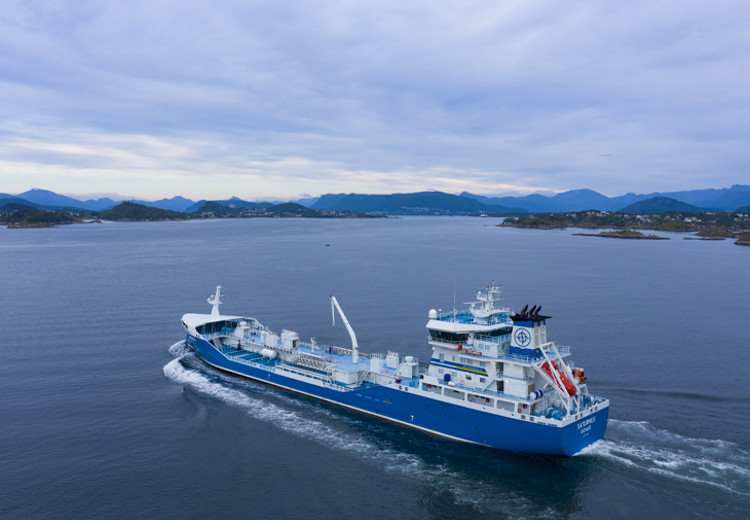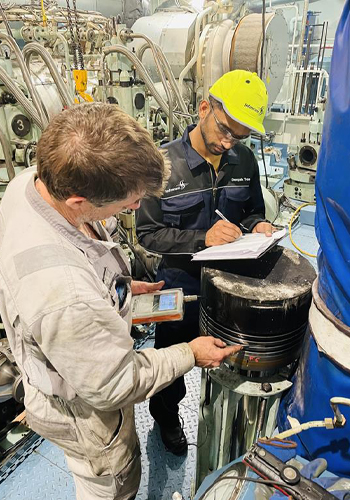CIMAC 2025
At the forefront of the energy transition
08 July 2025
Sirius Shipping and Infineum forge strong partnership over ten field trials and 31,000 hours of operation in two-stroke engines

Testing marine lubricants on board ships in real-world conditions is a vital part of the way Infineum develops reliable products for today’s vessels while also looking for insights into the needs of future operations. Deepak Tom, Infineum Marine Performance Test Engineer, talks to Sirius Shipping Technical Superintendent, Arvid Wachsmann, about the field trials that have been running for several years on two of their vessels to assess the performance of MAN ES Category II oils.

A Swedish family run business, starting with just one small tanker in 1994, Sirius Shipping has thoughtfully grown its organisation and fleet. Today, it is a tanker shipping company that provides full-service maritime transport solutions in Northern Europe with an unwavering commitment to quality, safety, efficiency and sustainability.
Infineum and Sirius Shipping started working together about four years ago. Running a mainly four-stroke fleet, the company invested in two-stroke oil/chemical tankers – the Mercurius and the Saturnus – which as Arvid explains, presented new operational challenges for them.
“Initially we were running a standard four ring pack and normal setup, and were switching between two oils, one to compensate for the calcium deposits, and the other oil for better cleaning capabilities. We would run a BN100 oil for a few hundred hours and then switch to a BN40 or BN25 oil, which meant we had to do more frequent scavenge inspections and carry out manual cleaning of the pistons and the ring lands. We were running on clean marine gas oil, with almost zero sulphur, which meant there was very little wear on the piston rings, so the sacrificial layer on them didn't wear out as it normally would. The field trial with Infineum on Saturnus was underway and so we had the opportunity to explore the best set up and lubrication strategy for this particular engine type. Infineum suggested we move to a three ring pack, which is the latest OEM recommendation, and we have been so pleased with the new set up and higher performing oil that we extended it to all pistons on Saturnus and then to the sister vessel Mercurius.
“What we have been really pleased about has been the close technical cooperation we’ve seen between Infineum, the engine maker, our crew, our chief engineers and our management team – who have all been involved in the project all along."
Arvid Wachsmann, Sirius Shipping
But of course it is not just about the successful collaboration, the lubricants needed to demonstrate good performance results too. “With the three ring pack on both Saturnus and Mercurius, in combination with the new MAN ES Category II oils we are seeing a very clean engine,” Arvid confirms. “I would almost call it a game changer. The liners are still in really, really good condition and the rings show basically no wear at all – great performance from the three ring pack, Cat II oil, Infineum combination. It's incredible, it's hard to believe.”

Having run nine trials for Saturnus and one for Mercurius, accumulating 31,000 hours of operation, Infineum has been able to provide good insights into the performance of the oil being tested on both vessels and has worked well alongside the crews.
“We saw that Infineum has really committed 100%. When Infineum service engineers and supervisors and those from the engine representative are on board, we always feel very secure. The fact that we can leave all the mechanical parts to Infineum people means our crew and chief engineer only assist when needed. Also if the chief engineer or crew had some technical issues, concerns or questions you are never more than a phone call or an email away and that’s a real benefit for us. This smooth operation throughout a project is crucial for us when we do this type of testing."
"Clearly a project like this is additional work for the crew in terms of tests or inspections but they have had fantastic support from Infineum and the engine supplier all along.”
The Infineum testing and validation process has opened a whole new world for Sirius Shipping. “The detail of your testing and measurements has been incredible to see on board at the start and end of test when you do all the detailed measurements of the rings and ring lands. You also take soot samples and you measure it in detail. In addition, the used oil analysis report is a useful tool to help us to see the condition and potential wear of the liners and piston rings during the process. It's really high tech stuff, we are impressed by your competence and expertise in this area, and we have learned a lot during these years – it’s not something we are used to seeing in our normal everyday operations, so it's impressive.”
With fleet operators looking for cost reduction and less downtime we wanted to find out about the longer term impact of this field trial collaboration to their fleet operation.
“The first change is that with the new Cat II oil we only need one oil on board,” Arvid explains. “That is a big advantage. And, with the previous operation we would increase the lube oil feed rate just to be on the safe side. Now we know we have a good oil, we are starting to assess if we can reduce the feed rate, which opens up a new option for us to minimise lube oil consumption and cost."
"The wear rate on the rings and liners is almost zero, which is incredible. If it stays like this we could extend the maintenance overhaul intervals for the piston rings for many hours.”
Arvid Wachsmann, Sirius Shipping
But as Arvid goes on to explain, the benefits go deeper than cost savings. “This operation makes it better for our crews’ welfare and that’s really important to us. Their workload can be reduced, there is no need to worry so much about changing feed rates or lube oil tanks, which is also a big advantage. And, we feel more confident in the condition of the cylinder and the piston – allowing us to extend the inspection periods. All this means our crews are happy, and that’s important because with a happy crew the vessel will also operate well.”
The introduction of International Maritime Organization (IMO) greenhouse gas regulations on route to a net zero 2050, is having a big impact on the shipping industry so how is Sirius Shipping preparing for them?
“We live in a changing world,” Arvid confirms. “There are a lot of new environmental demands and regulations. For example, in Europe we have FuelEU Maritime, which promotes the use of renewable, low-carbon fuels and clean energy technologies for ships, and we have IMO demands for increased efficiency. Sirius Shipping is in a fleet renewal programme called the 'Pathway to Zero' and we have in total seven vessels on order, two 15,000 tonnes vessels that will be prepared to run on methanol, a flexi LNG bunker vessel and four 8,000 ton battery-hybrid vessels. We are not prepared to say we will go all in with methanol or all in with LNG, everything is so uncertain – but we will be ready.”
At the end of the day, these types of decisions come down to the cost and availability of fuel. “It is not clear how much green methanol, green LNG or biodiesel will be available, so we are trying to spread our risk a little bit. We are entering an interesting period, and I think in the next 10 years a lot will happen in the maritime fuel market.”
Infineum is already running tests on lower carbon marine fuels including methanol and ammonia. So the million dollar questions are would Sirius Shipping do field trials again and would they recommend Infineum field trials to other shippers?
“The reason that we stayed throughout all these years and all these tests, is because of the trust and the support that we have felt from Infineum."
"We have done 10 tests, and we have never had any technical issues or any big concerns that have affected the operation or the vessel throughout all these years and all these tests - that is actually really impressive."
Arvid Wachsmann, Sirius Shipping
"I want to give a big shout out to our crews, they have been fantastic! They have done these tests with a fixed number of hours, the cylinder inspections, the pictures and so on. Thank you for your support, otherwise it would not be possible to do all this testing throughout the years. And yes, we would happily do it again, and we can really recommend Infineum for sure.”
Based on the articles you've read
Sign up to receive monthly updates via email